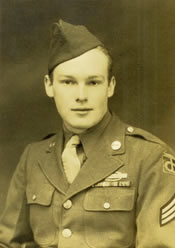He was the baby of the family, his father’s favorite and the spoiled one. At least that was the family lore. He grew up without electricity, using a back house. Christmas presents were purchased through the Sears & Roebuck catalog. The Canoe Place Inn, the canal and Flat Fish Alley were his playgrounds. He and his lifelong buddy Edgar and brother Larry would fish, hunt, clam and perhaps ‘borrow’ the odd watermelon from a neighbor.
The youngest of eight, born to an Irish-born Mother and Good Ground-born father, he grew up through The Depression. He often remarked that he didn’t think of his family as poor; there was always food, clothing and lots of love. Besides, everyone else was poor and it was all relative. He often spent evenings loading shuttles for his dad as he fixed his nets. Or at Emma Hulse’s General Store, twisting paper for the potbelly stove and listening to stories. School was not his favorite activity and it took him a bit longer than some to finish. He had many jobs and was offered a few that he didn’t accept. Not sure that he regretted not having the money to pay Olaf Anderson to be an apprentice in his blacksmith shop. Still, he and his friends spent many hours watching the craftsman at work.
The life of a young boy growing up in Hampton Bays ninety odd years ago was, as one can imagine, different than today and simpler to be sure. His older siblings provided him with nieces and nephews for playmates who were not much younger than he was. Groceries were bought at the general store on the corner or delivered by Greenbergs. Both the iceman and the milkman were regular visitors, as well as one-time employers.
Many of our Thursday stories were about events or people who were part of his life. Jack and Smitty were school mates. Elmer Jackson and Stan Penny were friends and yes, also employers. Al Smith was a familiar sight at the canal, church and the Inn. Yes, his family went to the World’s Fair and sold lilacs from their bushes. He remembered seeing the Hindenburg fly over.
When he was 18, his father passed away, leaving him to support his Mom. He dropped out of school and assumed his Dad’s position as janitor at the Hampton Bays Schools. But Uncle Sam quickly came calling and he was drafted. He plowed through – or was plowed through – boot camp and sent via England to France. He was on the front line for seven months. He participated in many of the major battles of World War II. When asked how he made it through these dark days, he said he just kept moving forward. During the Battle of the Bulge, he was removed from fighting due to frozen feet.
He spent three months recuperating and playing ping pong somewhere in England. Ah, but all good things must end and back to duty he was sent. Fortunately, peace was shortly declared and he did not have to return to the front lines. He was first sent to Versailles, where he supervised POWs in landscaping, then to Berlin, where he served in the occupation, before returning home with numerous medals, just in time for Christmas. His experiences were put away and not shared for decades. Reuniting with his friends and a brother who also served, he never had a conversation on what it was like to fear for your life twenty-four hours a day, nor did friends recount spending months as a POW. They all just resumed their lives as best they could.
Back to school, as janitor, bus driver and student! When he finally graduated in 1947, he said it was mostly because they were sick of him and no one honestly knew anymore what credits were needed or even if credits were needed. He had served his time. The rest of his life was ahead of him.
1948 brought marriage and a new happy chapter of his life that spanned 63 years. He built his own home. He remained a janitor for a whopping salary of $100 a month, but dreamed of owning his own business. Raising chickens was first on the list, followed shortly by nutria. Neither of these took off as hoped. He left his day job at the school for an evening job at the school and became a painter for Stan Penny.
By 1954, his son had been born and the pursuit of his own business was still on the horizon. Fanning Feed and Grain was considered and put aside when a neighbor mentioned that he was selling his fledgling oil business: one truck and a handful of customers. When he approached his father-in-law for a loan, an attempt was made to talk him out of this foolishness – coal was king, fuel oil was new and untried. His brother advised him to keep painting for Stan. After all, people always need their houses painted. Stubbornly, he clung to his dream and set about growing his business in his spare time.
A daughter joined his life a few years later and the ensuing years were mostly unremarkable. Family trips, lots of fishing and boating, work and life. The business continued to grow and ultimately was able to support the family. He was involved in his hometown in countless ways. Driving an ambulance, member of the Legion, Master Mason, Lion and Methodist Church Trustee, to name a few. This ‘hick from the sticks’ broadened his horizons, but never forgot his home. Honesty and integrity are words which shaped his life.
Sometime in his 80s, the need to face his experiences during the war pressed on him. He reconnected with the 90th Division, in which he’d served, and connected with the family of a soldier he served with, who never left the shores of France. He began to send flowers yearly to his fallen friend. The decision was made to join other soldiers and their families and follow his footsteps from Normandy. The French welcomed him and his comrades with open arms. The love and gratitude which poured forth from total strangers helped to heal and soften the memories of his war experiences. He was greeted as a hero, a word he would never have applied to himself.
What does this fine man have to do with the Historical Society you may ask? Well, apart from being lead fact checker for our stories, he participated in many oral histories and other programs we’ve presented in the past. He never said no when asked to meet with a friend or two and be video taped talking of their childhood. He was a living piece of history himself by the age of 95. He left his mark on scores of lives. His love of his family, shaped all their days.
He has gone now, leaving our lives in tatters. But the memories created will help to fill the void.
Rest well now Daddy. Know you were loved.
 Chet Sinclair
Chet Sinclair
1924 – 2020
A Life Well Lived
